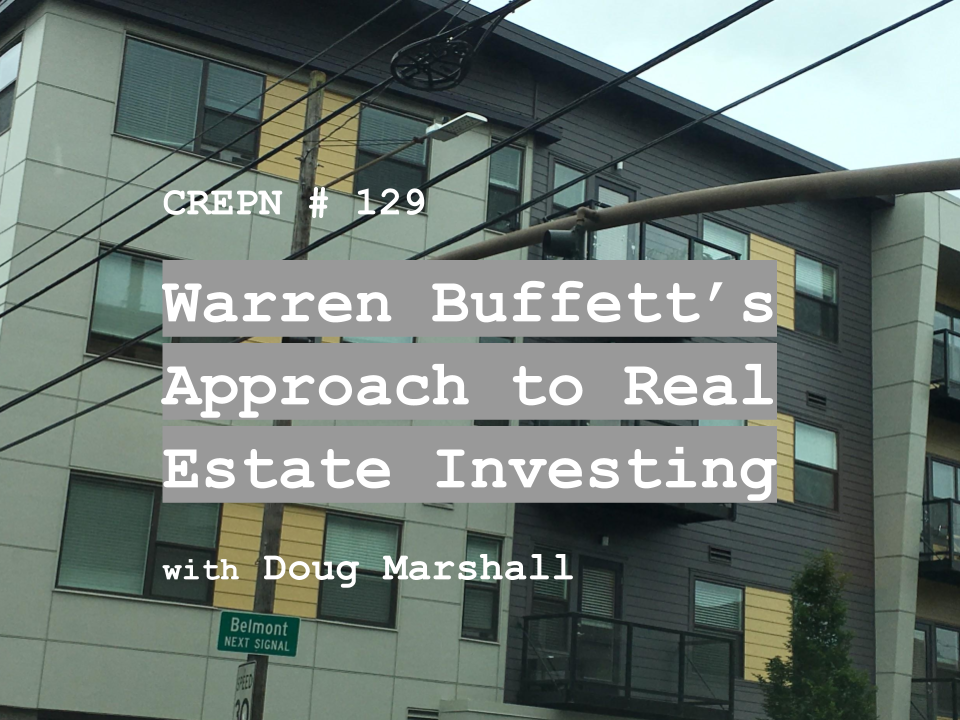
01 Feb CREPN # 129 – Warren Buffett’s Approach to Real Estate Investing with Doug Marshall
Warren Buffett, the CEO of Berkshire Hathaway, made his considerable fortune investing in the stock market. [x_audio_embed][/x_audio_embed] Last year Fortune magazine ranked him as the third wealthiest person on the planet with a net worth approaching $80 billion. But unknown to most people are Mr. Buffett’s two small real estate investments that he made long ago that have amply rewarded him for his willingness to invest outside his area of expertise. And far more important than their profitability were the five common sense principles he learned from his real estate investments. And before I get into what those were let me give you a brief explanation of his real estate investments. REAL ESTATE INVESTMENT #1 In 1986, he purchased a 400-acre farm located outside of Omaha, Nebraska. He purchased the farm from the Federal Deposit Insurance Corporation (FDIC) who had inherited it from a bank that failed. Mr. Buffett admits that he knows nothing about farming but he has a son who loves to farm so he turned the day-to-day operations over to him. Although Mr. Buffett admits his lack of farming acumen he could easily recognize that purchasing the farm was a good investment decision. As he said, “I needed no unusual knowledge or intelligence to conclude that the investment had no downside and potentially had substantial upside.” Three decades later, the farm has tripled its earnings and is now worth five times what he paid for it. REAL ESTATE INVESTMENT #2 In 1993, he purchased a retail property located adjacent to New York University that the Resolution Trust Corporation (RTC) was selling. A real estate bubble had popped and the RTC had been created to dispose of assets of failed savings institutions. His investment analysis was very rudimentary. The property had been poorly managed by the previous owner and then by the RTC. The vacancy at the property was well above the market’s vacancy rate for no apparent reason. The largest tenant’s rent was $5.00 per square foot compared to all the other tenants’ rent averaging $70.00 per square foot. He realized that when the current lease term expired for this tenant that the new rent on this space would improve the property’s cash flow dramatically. And like the time he purchased the farm, he realized that he needed to turn the management of the property over to an experienced property manager, which he did. Over a relatively short period of time, the new property manager was able to lease the vacant space and to raise to market the rent on building’s largest tenant. As a result, the property’s net cash flow tripled and annual distributions currently exceed 35 percent of his original investment. So those are Mr. Buffett’s two attempts at real estate investing. Both were highly successful. But as good as his results were the principles he learned were priceless. LESSONS WARREN BUFFETT LEARNED FROM INVESTING IN REAL ESTATE So what did Mr. Buffett learn from his two real estate investments? He learned five things that we as real estate investors should try to emulate.
- Notice that he bought both properties out of foreclosure when the real estate market was at the bottom of the cycle. “I will tell you how to become wealthy,” Mr. Buffett once said. “Be fearful when others are greedy. Be greedy when others are fearful.” When he bought these two properties most investors were out of the market, fearful that real estate wasn’t ever going to turn around. Mr. Buffett knew differently and acted upon it.
- You don’t have to be a real estate expert to achieve satisfactory investment returns. But you do need to turn over management of the property to someone who is well qualified to manage the property for you.
- You don’t need to do a sophisticated investment analysis to determine whether to purchase a property. Many times a common sense look at the property will do. Ask yourself, “What is holding this property back from operating well?” If you can answer this question and you’re confident that you can correct the problem, then buy the property.
- Investing over the long term will eventually solve most problems. Notice he still owns these two properties, one he bought in 1986 and the other he bought in 1993. As he likes to say, “Our favorite holding period is forever.”
- He didn’t concern himself about their daily valuations. He understood that he bought the properties at bargain prices and that overtime they would make good investments. “Games are won by players who focus on the playing field,” he quipped, “not by those whose eyes are glued to the scoreboard.”

